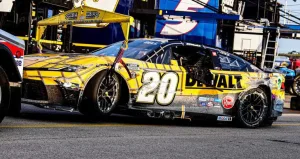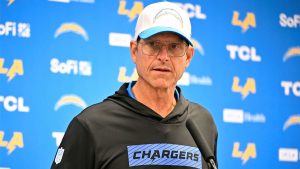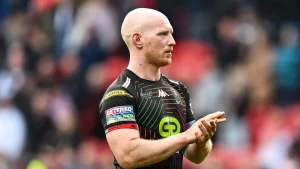
In a high-stakes move that has sent shockwaves through the world of NASCAR, Michael Jordan’s 23XI Racing team, along with another high-profile organization, has been denied charter status for the upcoming season. The decision has ignited a fierce legal battle that could reshape the future of NASCAR team ownership and race entry rights, placing the sport’s business practices under intense scrutiny.
The controversy revolves around the contentious process by which NASCAR grants charters — essentially, the right to compete in all races without having to qualify through speed or other criteria. These charters, introduced in 2016 to stabilize the sport and increase team values, are now at the heart of a growing dispute involving 23XI Racing, owned by NBA legend Michael Jordan and driver Denny Hamlin, and the competing team, which has yet to be officially named in the legal filings.
What is a NASCAR Charter?
NASCAR charters are a critical part of the current NASCAR Cup Series framework. With a limited number of charters available, teams that secure one are guaranteed a spot in each race of the season, regardless of qualifying times or performance in previous events. This stability is crucial for teams to secure sponsorships, plan their season, and ensure their drivers have a place to race each week. The charter system has become one of the most sought-after assets in the sport, increasing the value of teams and giving owners a degree of certainty in an otherwise volatile racing environment.
Currently, only 36 charters are granted, and while the competition for these spots has always been fierce, the stakes have never been higher. For teams that do not receive a charter, they must rely on either qualifying through the open entry process or being granted a provisional entry, both of which are much harder paths to securing a full-time ride in the series.
The Denial of Charters: What Happened?
Michael Jordan’s 23XI Racing, which has rapidly become one of the most well-known teams in NASCAR since its founding in 2020, was one of two teams that were recently denied charter status for the upcoming season. The team’s impressive performances with drivers like Bubba Wallace and Tyler Reddick, combined with the backing of Jordan’s celebrity and wealth, had many expecting 23XI to be a lock for a charter.
However, NASCAR officials, in a move that has stunned many in the industry, opted not to grant the coveted charter to 23XI Racing or the other team involved. While the official reasons behind the denial remain unclear, sources suggest that issues related to team performance, funding, and the overall business model of the two organizations may have played a role. NASCAR’s decision has been widely interpreted as an effort to maintain a competitive balance within the series and ensure that teams with the necessary resources and infrastructure are granted guaranteed spots.
The decision to exclude 23XI Racing has raised immediate concerns about the fairness and transparency of the charter allocation process. Michael Jordan, a known advocate for fairness and equality both in sports and business, has expressed his frustration with the decision, hinting that the process could be influenced by factors unrelated to on-track performance.
Legal Action: A Fight for Fairness
In the wake of the denial, both 23XI Racing and the other affected team have filed lawsuits against NASCAR, accusing the sanctioning body of unfair practices and biased decision-making. The lawsuits allege that the denial of charter status is not only unjust but could be detrimental to the sport’s integrity, potentially affecting sponsorship deals, team operations, and overall fan engagement.
At the heart of the legal battle is the claim that NASCAR’s charter allocation process lacks transparency, with decisions seemingly being made without clear and consistent criteria. The plaintiffs argue that NASCAR’s actions have created an uneven playing field, making it harder for new teams — especially those owned by high-profile figures like Jordan — to compete at the highest level of the sport.
The lawsuit also raises questions about the power dynamics within NASCAR, with critics suggesting that the league may be favoring certain teams or owners over others. This has led to accusations that NASCAR is protecting the interests of its established, legacy teams, which could create a barrier for new entrants looking to shake up the status quo.
What’s at Stake?
The outcome of this legal battle could have far-reaching implications for the future of NASCAR. If 23XI Racing and the other team are successful in their lawsuit, it could force NASCAR to reevaluate its charter allocation process and open the door for more flexibility in how charters are awarded. This could benefit other emerging teams and owners looking to break into the sport, while potentially leading to a more dynamic and competitive racing environment.
On the other hand, if the court rules in favor of NASCAR’s current charter system, it could signal the continuation of a more restrictive and controlled environment in which established teams hold significant power. It could also discourage future entrants, particularly those backed by high-profile owners like Jordan, from investing in the sport if they feel the system is rigged against them.
NASCAR’s credibility, too, could be on the line. As a major motorsport organization with a rich history, NASCAR prides itself on its commitment to fairness and competition. However, the growing perception that its business practices are opaque and possibly exclusionary could erode the trust of fans, sponsors, and potential team owners.
The Impact on 23XI Racing
For 23XI Racing, the denial of a charter presents a significant challenge. Since its inception, the team has been seen as a breath of fresh air for the NASCAR Cup Series, bringing new energy, diversity, and celebrity appeal. Michael Jordan’s involvement has been particularly noteworthy, as the basketball legend’s entry into motorsports has drawn attention from outside the traditional NASCAR fanbase.
If the team is forced to compete without a charter, it could impact their long-term plans, including their ability to attract top-tier sponsors and maintain a consistent presence at every race. Jordan, who is known for his business acumen, may be able to navigate these challenges, but the legal battle could ultimately detract from the team’s focus on racing performance.
Additionally, the lack of a charter could make it more difficult for the team to recruit high-profile drivers in the future, as the uncertainty of qualifying each week might not appeal to potential talent. This could hinder 23XI’s ability to build a competitive roster and develop the kind of momentum needed to challenge for championships.
What Comes Next?
As the legal proceedings unfold, both sides are gearing up for a long and costly battle. NASCAR has yet to comment publicly on the lawsuit, and it remains to be seen whether the organization will make any changes to its charter process moving forward.
For 23XI Racing and its co-owner Michael Jordan, this is far from over. The legal outcome could not only change the way NASCAR operates but could also redefine what it means to own a team in one of the most prestigious motorsports series in the world.
With the 2024 season rapidly approaching, the eyes of the racing world will be firmly fixed on this legal showdown — a battle that could determine not just the fate of two teams, but the future of NASCAR itself.







